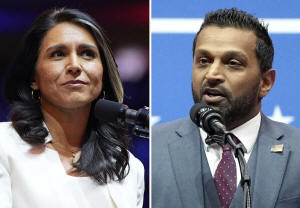Intelligence sharing by the US and its allies has saved lives. Trump
could test those ties
 Send a link to a friend
Send a link to a friend
 [January 27, 2025]
By EMMA BURROWS and DAVID KLEPPER [January 27, 2025]
By EMMA BURROWS and DAVID KLEPPER
LONDON (AP) — As Russia moved closer to invading Ukraine nearly three
years ago, the United States and its allies took the extraordinary step
of declassifying and sharing intelligence to expose Moscow’s plans.
Information flew across the Atlantic from U.S. spy agencies to NATO and
Western partners showing that Russia was poised to launch the biggest
attack on a European country since World War II.
It was designed to muster support for Kyiv, and on the strength of the
U.S. warning, some nations sent weapons to Ukraine, which moved some
equipment out of the range of Russian strikes.
Now, officials are bracing for a potentially changed security landscape
under President Donald Trump. He has criticized America's allies and
lambasted its intelligence agencies. He's been accused of disregarding
secrecy rules and hoarding classified documents.
Tulsi Gabbard, Trump's pick for director of national intelligence, has
parroted Russian propaganda while his nominee to lead the FBI, Kash
Patel, has promised changes that could significantly curtail the flow of
intelligence to America's friends. Both are expected to face sharp
questioning from lawmakers during confirmation hearings Thursday.
The Associated Press spoke with 18 current and former senior European
and U.S. officials who worked in NATO, defense, diplomacy or
intelligence. Many raised questions and concerns about Trump's past
relationship with America's spies and their ability to share information
at a time of heightened terror threats and signs of greater cooperation
between U.S. adversaries.

The importance of trust
The U.S. and its allies routinely share top-secret information, be it
about potential terror threats, Chinese cyberattacks or Russian troop
movements. America's closest intelligence partners are New Zealand,
Australia, Canada and Britain, and it often shares with other nations or
sometimes even adversaries when lives are at stake.
In July, the U.S. helped foil a Russian plot to assassinate the head of
a German arms manufacturer that produced weapons for Ukraine. In August,
the CIA said it provided intelligence to Austrian authorities that
allowed them to disrupt a plan, allegedly inspired by the Islamic State
group, to attack a Taylor Swift concert in Vienna.
Cooperation particularly between the U.S. and the U.K. is “strong and
robust enough to withstand some turbulence at the political level,” said
Lord Peter Ricketts, former U.K. national security adviser and current
chair of the European Affairs Committee of the upper chamber of the
British Parliament.
However, any strong intelligence relationship is underpinned by trust,
and what if “trust isn’t there?” Ricketts said.
There was some skepticism about U.S. intelligence ahead of the invasion
of Ukraine due to the faulty American information that led to the
invasion of Iraq in 2001, said Oana Lungescu, a fellow at the Royal
United Services Institute in London and formerly NATO's longest-serving
spokesperson.
But when combined with information from its security partners, America's
“remarkable intelligence" enabled the NATO alliance to raise the alert
about Russia, Lungescu said.
European leaders are working to convince Trump's administration that
threats on the continent also are relevant for the United States.
There shouldn't be much debate, said former U.S. Ambassador to Russia,
Mike McFaul, who said there's a direct relationship between U.S.
intelligence sharing and national security. He noted that U.S.
authorities have warned of escalating terror threats.
“One of our great advantages is that we have incredible intelligence
capabilities and we have allies that we share that with — it’s a force
multiplier for us,” said McFaul, who now teaches at Stanford University.
“We’ll lose that if we’re no longer considered trustworthy.”
The Trump team has an “open mind and is in a listening mode,” Norway’s
Prime Minister Jonas Gahr Støre said, adding that was a good sign
because “when you come in with a new administration in a very eventful,
rapidly changing environment, getting on the same footing is a
challenge.”
Predicting Trump’s moves, however, is difficult. He has criticized NATO
allies for not spending enough on defense. He even suggested he would
encourage Russia to invade countries that didn’t pay what he thought
they should. But he didn’t follow through on the threat.
“Last time it didn’t turn out so badly: He was going to throw NATO under
the bus, but he didn't do that," former U.S. Director of National
Intelligence John Negroponte said. "The rhetoric turned out to be
transactional.”
Spokespeople for the White House and Gabbard did not respond to
questions about Trump and his nominees or how they planned to handle
intelligence sharing with America’s allies.
[to top of second column]
|

This combination photo shows National Intelligence Director nominee
Tulsi Gabbard, left, Oct. 27, 2024, in New York and FBI Director
nominee Kash Patel, in Washington, Monday, Jan. 20, 2025. (AP Photo)

NATO members have hiked their defense spending — as Trump has
demanded — and the alliance is now bigger than before, with Sweden
and Finland joining after Russia invaded Ukraine.
“There is a big risk of continuing to take American support for
European, NATO countries ... and defense of Ukraine for granted,”
said Swedish Prime Minister Ulf Kristersson.
But it would also be risky to assume “the U.S. is simply leaving.”
On that question, Kristersson said, “the jury is very much out.”
Concerns about Trump's intel picks
Trump’s choice of Gabbard to oversee more than a dozen intelligence
agencies has alarmed lawmakers from both parties and many current
and former intelligence officials. Gabbard, a former Democratic
congresswoman who later became a Trump ally, met since-deposed
Syrian President Bashar Assad in 2017 in Damascus and has promoted
Russian propaganda about its invasion of Ukraine.
If confirmed, Gabbard would have the power to declassify information
and direct some intelligence sharing with allies.
A European intelligence official, who spoke on condition of
anonymity to discuss sensitive matters, said that while there is
concern around some of Trump’s nominations, there is “no reason to
think we can’t trust them because of who is in power.”
The official suggested nominees like Gabbard and Patel “haven’t
heard all the facts yet” and could “grow and learn” when presented
with the full picture.
With thousands of professionals working in a multitude of agencies,
the day-to-day operations of America’s spy services may look very
similar under the Trump administration. And there are safeguards,
current and former officials told the AP, that include agencies
sharing intelligence but not sources.
But those in top positions will have a huge impact if they lead to
staff departures, curtail longstanding surveillance programs as
Patel has suggested or politicize their offices in ways that can be
exploited by Moscow and other adversaries.
The task for Europe is to convince everybody to focus on Russia,
”the real troublemaker,” the intelligence official said.
Alongside Gabbard, Patel has rattled intelligence insiders in the
U.S. and elsewhere because he's criticized surveillance programs
like the Foreign Intelligence Surveillance Act, which U.S.
authorities use to keep tabs on suspected spies and terrorists
overseas.
The United States shared intelligence gathered through that law with
Russia when public safety was at stake, passing along a warning
before a deadly concert attack in Moscow in March that killed 145
people. It is not clear if Moscow tried to act on the warning.

Allies heavily depend on US intelligence
The European Union must be realistic that “if the U.S. is reducing
its participation in Europe, European members have to be ready to
fill any gap,” said former Finnish President Sauli Niinistö, who has
called for the 27-nation bloc to create its own intelligence agency.
Many global tech and communication firms such as Google, Apple and
Microsoft as well as Elon Musk’s X are based in the U.S., giving
American law enforcement and spy agencies an advantage over their
foreign counterparts, which may lack the political or legal means to
obtain information.
Niinistö hosted a summit between Trump and Russian President
Vladimir Putin in 2018, in which Trump openly questioned his own
intelligence agencies’ finding that Russia meddled in the 2016 U.S.
election to his benefit, restating Putin’s claim that Moscow was not
involved.
Niinistö, whose country borders Russia, described his discussions
with Trump while in office as clear, open and frank.
“I tried to tell him: ‘We need you, but you need us, too,’” Niinistö
said.
___
Klepper reported from Washington.
All contents © copyright 2025 Associated Press. All rights reserved |